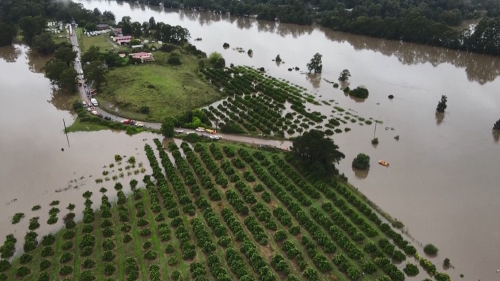Soil Salutations, A New Band-Aid, and Runaway Rice
Check out our roundup of the week's top news and research in food, agriculture, and global development.

Top Story
UNGA’s Concurring Crises
At the 77th session of the UN General Assembly, attention has been focused on the effects of the war in Ukraine and climate change on the global hunger crisis. The concurring crises are exacerbating inflation, and food and energy prices, and thus have inspired multiple leaders—including from Ukraine, Japan, France, Spain, the Philippines, and Germany—to urge industrialized nations to take more action. Despite the attention it’s receiving, however, there are still questions of whether notable change will be made.
Council Insights
Food Assistance Exclusion
“Hunger continues to pervade disabled and minoritized communities because of ableist, culturally selective policies that make it difficult for people to access the food they need,” writes Natalie Burdsall in Global Food for Thought. Read the full blog post to learn why food assistance programs must incorporate dietary needs and cultural requirements.
Food & Agriculture
Trashy Floods
Regions in Australia that were previously drought-stricken are now confronting a new problem: flooding. Moving from one extreme to another, Australia’s flooding is worsening, with higher flood levels that last for longer. Farmers’ fields are often completely submerged, and leave them with debris and trash washed in from the ocean when floods abate.
Testing Solidarity
The consequences of Ukrainian support are testing solidarity of EU farmers. After removing tariffs and quotas to allow Ukrainian exports, farmers now must compete with what they view as a flood of cheaper Ukrainian grain and poultry. In response, EU farmers are protesting the measures, calling for their governments to curb the flow of Ukrainian agricultural products into the region.
Runaway Rice
After restricting rice exports earlier this month, India is now considering allowing overseas shipment of some rice cargoes stuck at its ports. India’s protectionist move to curb rice exports was an attempt to boost local supplies and calm prices after a below-average monsoon season reduced planting, but it trapped approximately one million tonnes of grain at its ports and increased global rice prices. Vietnam and Thailand are also expected to raise rice export prices, worsening the already escalating shortage.
Deeper Dive
Why Does Protectionism Hurt Farmers?
Protectionism refers to policies that protect domestic industries against global competition through using tariffs, subsidies, import quotas, and other restrictions. Through using protectionist policies, governments are often attempting to keep national prices low, which inadvertently depresses international prices of farm products. This consequently lowers farmers’ earnings, and ultimately worsens global inequity and poverty.
Data Crunch
Warring Prices
The war in Ukraine continues to play a key role in the global food crisis. Immediately following Putin’s speech threatening a nuclear response in Ukraine on Wednesday, wheat prices increased as much as 3.4 percent, while corn increased 1.1 percent. FAO warns the conflict between the world’s biggest grain exporters will remain a key issue for stretched food markets in the future.
Resilience
Soil Salutations
As climate change makes droughts and flooding more intense, soil quality is quickly deteriorating around the globe, but some farmers are finding new solutions to prevent long-term damage. Through using quick-growing plants, applying fresh layers of mulch, and planting trees, farmers can improve soil fertility with lower costs than industrial fertilizers.
Big Ideas
Breaking Tradition
As prices for biofuels and food rise, new opportunities are abound for indoor farming. Known as Controlled Environmental Agriculture, its infrastructure can be easily built and requires less water than traditional agriculture. This allows for optimal results in regions where water and fertilizer are limited, and can localize the growing of high-demand crops.
DC Report
A New Band-Aid
In an address to the UNGA, President Biden announced nearly three billion dollars of aid to address global food insecurity. This promise builds on the $6.9 billion already committed by the US this year. The funding will increase emergency food security programming, improve food and nutrition assistance, and promote climate-smart agriculture, among other initiatives.
Big Actors
Harmful Democratic Decrees
Malawi successfully established a democratic government three years ago, but food insecurity is still on the rise. As a small, landlocked, resource-poor country, Malawi struggles to maintain the economic growth it needs to survive. With roughly 80 percent of the populations making a living from farming, Malawi’s strict export bans, price caps, and high fertilizer prices are doing more harm than good, and are perpetuating an economic decline that could become catastrophic.
Trade & Commodities
Consolidating Power
Power over global food chains is concentrated in a declining number of companies, with only two companies controlling 40 percent of the global commercial seed market. Agricultural commodity trading is similarly concentrated, with only 10 companies dominating the market. This shrinking number of actors is consolidating power in the hands of a select few, and could have a deleterious effect on food control and global prices in the future.
Council Events
Did you miss one of our previous livestreams? Don't worry! They are all available on our website to watch at any time.
Other Upcoming Events
Food Waste: Access, Affordability, and Acceptability
Date: September 29
Time: 4:00 - 5:30 p.m. ET
October Food Justice Job Fair
Date: October 5
Time: 4:00 p.m. CT
Rethinking Research and Policy Analysis for Inclusive and Sustainable Food Markets and Value Chains
Date: October 13
Time: 2:08 - 4:08 p.m. ET
Land Acknowledgement Statement
The Center on Global Food and Agriculture recognizes it occupies the ancestral land of the Kiikaapoi, Peoria, Kaskaskia, Bodwéwadmi, and Myaamia people. Indigenous communities around the world disproportionately experience the pressures of climate change, global conflicts, and the COVID-19 pandemic, while simultaneously stewarding 80 percent of the world’s biodiversity. These Indigenous tribes and nations are the original owners of this land and continue to be systemically erased by policies and practices that ignore their histories. To learn more about Indigenous foodways and practices, check out our 2022 blog series "Stewardship, Sovereignty, and Solutions."
Related Content
- Embracing Dandelions as Food and Medicine
- Going Beyond Regenerative Agriculture on Tribal Lands
- Expanding "638" to Enhance Native American Food Sovereignty
- Flavors and Culture: Food Systems Through Indigenous Women's Eyes
- A Thanksgiving Legacy: Fighting for Indigenous Food Sovereignty
- Native Food Sovereignty: Strengthening Connection to Culture
- Reconnecting to Indigenous Food Sovereignty Values and Practices
- Embracing Interconnectedness: How Indigenous Foodways Can Save Us

